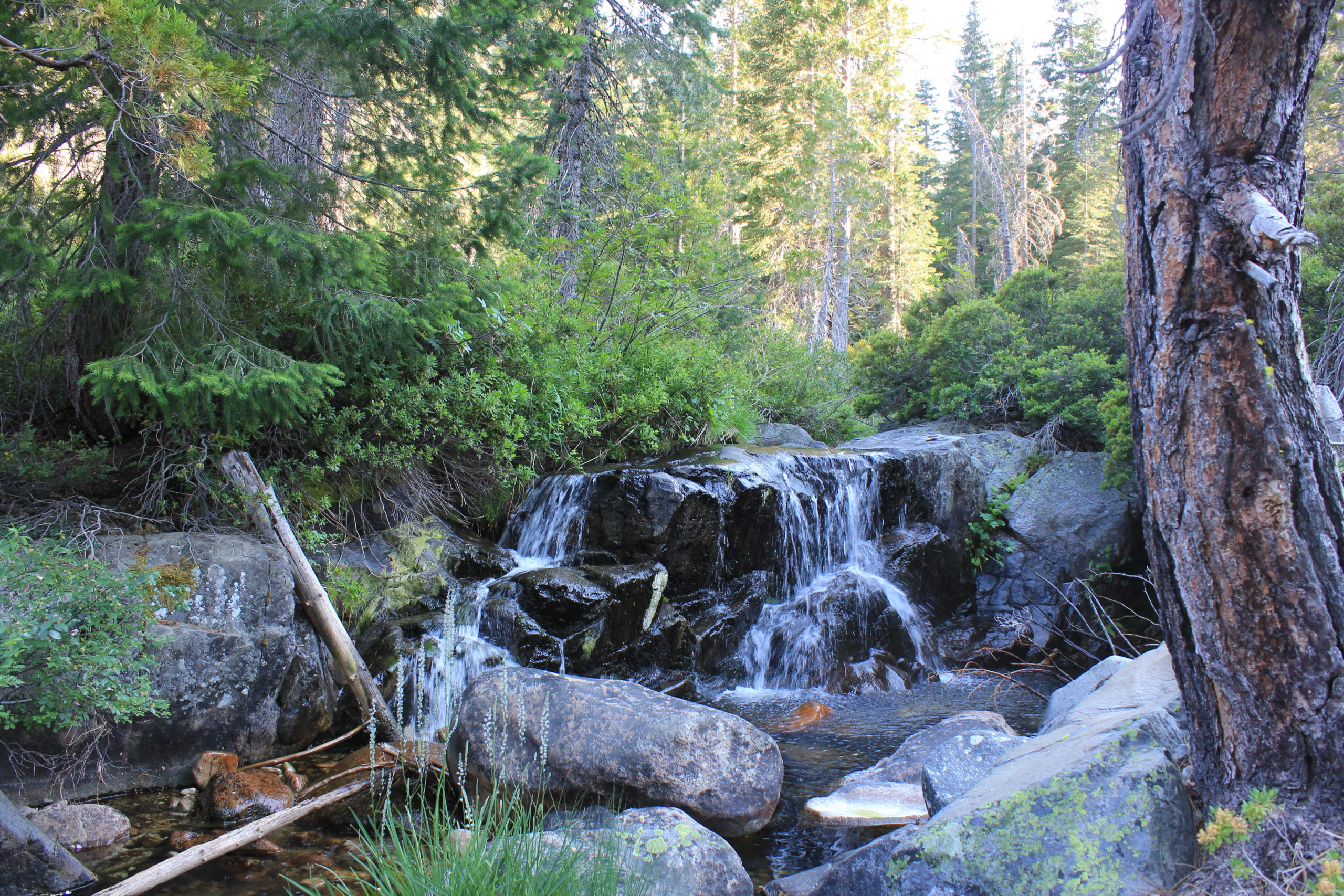“The world is a very puzzling place. If you’re not willing to be puzzled,
you just become a replica of someone else’s mind.”
— Noam Chomsky
As the departure day grew closer, many questions still nagged at the erstwhile tour guide. Would I be in shape to go? Could I get the days off from a busy schedule? Would there be conflict with Dimari’s work schedule, or Miles playing in the Little League playoffs, or Jordan getting a job? Everyone is so busy with the details of life, they forget that living is the only detail that matters.
I had no doubts about Jordan’s stamina, or ability to hike in the wilderness, as he had been running for his school’s cross-country team for a couple of years. Dimari was sturdy, and in excellent shape from working out in the gym, and renovating their house (with Fiona’s help). Miles was the youngest of our party, and although very athletic by nature, was known to whine and complain on even moderate hikes, or when walking the dog on an uphill slope. He was already an accomplished baseball player and karate student, however, and I believed he possessed the will to put aside his childish privileges and walk like a man. Anyway, it would be great for him to get out of the house, and do something new. There’s something about carrying all your own stuff in a backpack that makes lasting memories. Kids never remember their best day playing video games!
I supplied my expedition partners with the camping lists I had carefully compiled over the years, detailing all the things to bring (or not to bring) on a 5-day trip. I also shared a significant pile of cast-off or marginal backpacking gear I had accumulated over the decades, and encouraged them to rummage through all the boxes. They wound up with an assortment of old and new gear (just like my menagerie), and then Dimari took the boys to REI to select a full larder of dehydrated delicacies. I presented Jordan with my trusty old Buck knife, which had since been replaced by a lighter model. Miles was thrilled to receive my Swiss Army knife – the one with all the gadgets a 10-year-old could ever dream of. In this way, I let them bring a little of my past experiences on this new adventure.
We assembled in Pinole early in the morning, amidst the chaos and debris of home remodeling. Their kitchen was gutted, and awaiting delivery of new tiles that Fiona planned to install while we were away. The ceiling was being redone, and the 3 main sections of the home had been combined into a single great room by knocking down unnecessary walls. It was a glorious mess of disorderly dogs, dust, and plastic-covered furniture; so our backpacking gear fit in perfectly. The four “Epps Men” would be crowded inside Dimari’s trusty Honda Civic, with our bulging packs crammed into the trunk, leaving no room for overnight gear. In other words, the plan was to drive all the way to the trailhead, don our tools of ignorance, and see how far we could make it up the trail in 100-degree heat.
At last we departed – sometime before lunch and after Dimari finished his usual deliberations. We immediately stopped for gas and a cup of coffee, and began our journey across the vast, drought-stricken interior of California. Predictable tangles with Bay Area traffic prevented us from making record time, but we arrived in Redding hungry and ready for anything. A quick search on my phone revealed an interesting lunch spot within easy access from the freeway. Giff’s Steakburger featured the famous “Ugly Burger,” a dubious treat that tantalized the adventuresome spirit of our party. We found the little hole-in-the-wall nestled within a faded strip mall, in the same greasy space it had occupied for 41 years. Inside, we found the owner, Dick, manning the grill and dishing out witty verbal banter that matched the sarcastic signs scattered throughout the restaurant. “$5 Charge for Whining” hung crookedly on a rusty nail, and the menu board featured the “Obama Special: order whatever you want, and the guy behind you will pay for it.”
“I don’t think we’re in the Bay Area anymore,” I said to nobody in particular, as a placard advertising their stellar service waved a cartoon hand at me, displaying a defiant middle finger. The walls and shelves were loaded with NASCAR gear, collectibles, and memorabilia.
“Git out yer wallet and stand over there,” Dick ordered brusquely from behind the smoking grill, with a sly twinkle in his eye. He exuded a peculiar blend of friendliness and passive-aggressive American cynicism, with faded Navy tattoos all over his forearms. His handlebar mustache had seen better days, and was stiff with grease.
“Four ugly burgers?” his cheerful wife inquired, making it obvious we would be foolish to order anything else. We all nodded as hungry supplicants, and added two baskets of fries and onion rings to make sure our digestive systems would be locked up for days. (It’s desirable to skip a bowel movement or two when spending time in the wilderness.)
Next to a sign that informed us there was no wi-fi (“try talking to each other instead”), we dispatched the exceptionally fast food with a ravenous gusto that would have impressed a starving bear. When the waitress (also Dick’s wife) inquired how we were doing, I informed her we had just experienced the “ugliest meal of our lives,” and she laughed in a way that indicated I had said exactly the right thing, and we were now accepted into the honorable fraternity of ugliness.
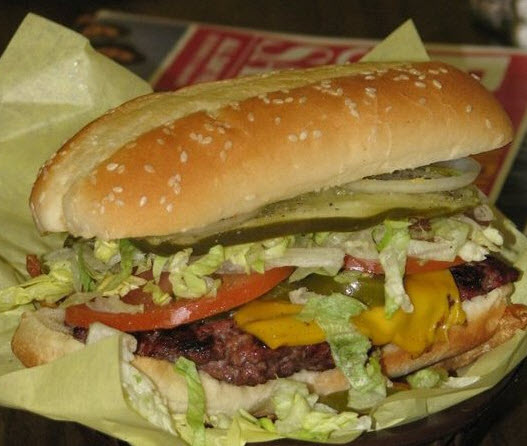
Back on the road, the boys grew more excited as we crested the ridge out of Redding, and viewed the blue expanse of Whiskeytown Lake, its shoreline still scarred and stubbled with burnt-out trees. The undergrowth was beginning to show signs of cautious rejuvenation after the Carr fire a few years back, and someday the trees might again carpet the mountainsides. California was experiencing a major drought again, and the reservoirs back home were only about 1/3 of where they should be in the early summer. Whiskeytown was full, however, and showed promise that the great expanses of dryness that dominated our climate would eventually yield to the warm currents and wetness that brought life to the coast of North America. Or would the relentless ravages of human-made climate change alter even the great cycles of the Pacific Ocean? That would be for Jordan & Miles’ generation to find out.
We took the Lewiston shortcut to bypass Weaverville, and made our way up Highway 3. The first glimpses of Trinity Lake were disgusting. It appeared to be only about 25% full. It was abysmal to see so much shoreline – bleached and red, and devoid of plant growth. Boaters had to reach their craft with 4-wheel drive vehicles, and the “beaches” were at 45-degree angles. This debacle was all so unnecessary: to dam up a beautiful and historic river valley, mostly for the purpose of pumping it out again for agriculture and cattle. The sight of so much emptiness where acres of vital blue water used to be really intensified our awareness of the drought. By the time we passed Trinity Center, the water had petered out entirely, leaving a wide scar of traumatized earth that exposed the tailing mounds left over from hydraulic mining in the Nineteenth Century. The ravages of human entitlement were on depressing display for anyone who cared about the land.
It was getting very hot. Getting out of the car, at the former Coffee Creek Ranger Station, we immediately felt like melting cookies being shoved into an oven. The formerly bustling facility now housed only a few rangers and firefighters, and was closed to the public. Still, a wilderness permit was available at a self-serve kiosk, and I filled it out while the boys read the torn and dusty posters about bear security, stock management, and campfire regulations. It wasn’t a surprise to see that campfires were only allowed in developed firepits, owing to the historic heat and dryness. We quickly returned to the relative comfort of the old sedan’s air-conditioned cabin. Dimari patted her dashboard fondly. “She’s still going strong!” The analog odometer showed almost 200,000 miles, but the temperature gauge was too traumatized to tell us anything.
We made it to the trailhead by 2:30, with the bottom of the overloaded car scraping a little in the rough places along the access road. There were only 2 other vehicles there, which surprised me, but that left a shady parking space open – although it provided little respite from the fierce sunlight. The thermometer on my pack read 102 degrees, but it had been in the hot trunk. Now we had a simple choice: stay overnight down by the river in the intense heat, or try to hike as high and far as we could to escape it. The former would allow us to tackle the trail at the coolest time of day tomorrow, while the latter meant we’d have to strap on our packs and abuse our bodies during the peak of the furnace. We could enjoy the coolness of the Trinity River here, but staying overnight meant unpacking and repacking our backpacks. Hiking now would give us an extra half day of enjoyment by getting to Big Bear Lake early. These choices bounced around our brains like sneakers in a clothes dryer, and the restlessness of wanting to do something to relieve the heat made it a foregone conclusion. We struggled into our pack straps, slathered ourselves with sunscreen, and crossed Bear Creek by 3:00. Two partially frozen gallons of water had to be hand-carried at first, but we would soon drain those of their contents.
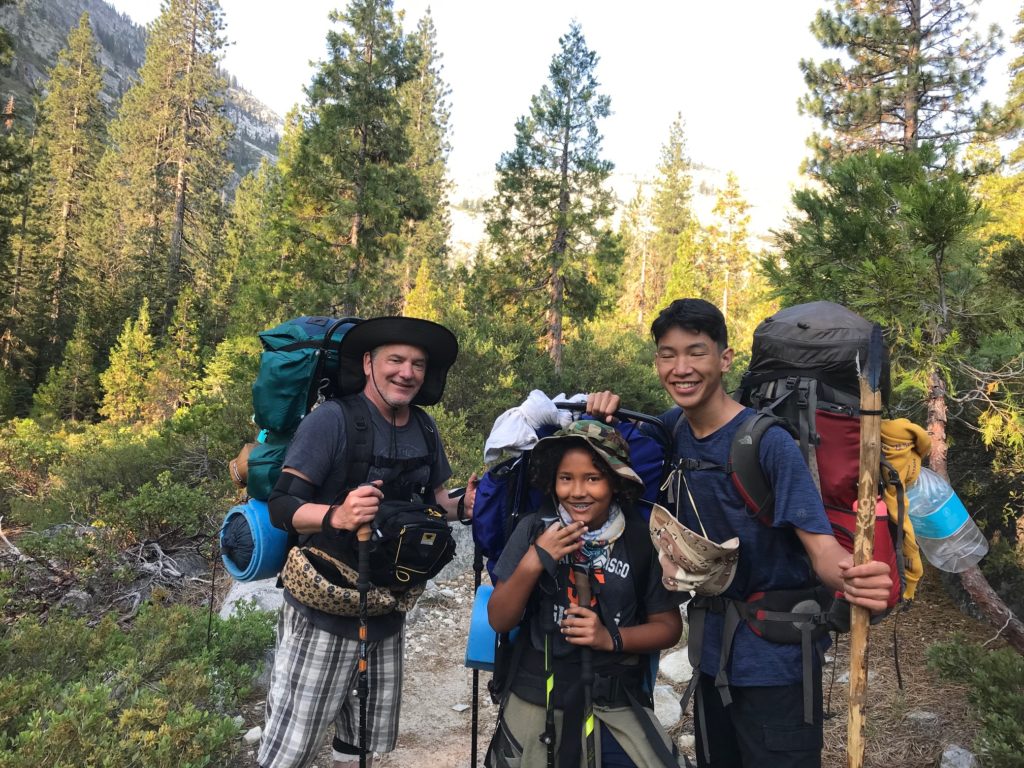
I took the lead so I could watch for rattlesnakes, which were coming down from the hills all over California; seeking water. The trail followed Bear Creek to its cooler source in the mountains, which made it a convenient byway for all sorts of critters. Bears were unlikely, given the heat and easy availability of barbecue and picnic baskets down by the big lake where the careless tourists hung out. Jordan and Miles followed me, shifting and adjusting their unfamiliar loads under their straps. Dimari took up the drag, gingerly settling his own burden onto a back that was sore from home improvement projects. Not including water, we were carrying about 40 lbs. each (except for Miles, who still carried a lot for his age). I expected to hear a chorus of complaining – because that’s what I did as an eleven-year-old first-time backpacker – but my grandchildren bravely tolerated the toil and suffering of their introduction to being beasts of burden.
The amazing Miles did a great job adjusting to the heat, and the plodding pace demanded by the terrain. He was an active and determined boy, who recently earned a brown belt in karate, and was forging an iron will at a young age. His outward manner was often surly and pouty, but that only masked a brave heart and gladsome spirit. The world amazed him, too, and he was eager to learn and quick to incorporate new skills into his repertoire. We settled into a deliberate pace so the old fart (that’s me) could often park his scrawny butt on any suitable log or rock to catch his breath. The first part of the trail was always hard on me, owing to my normally sedentary existence in an office chair or couch. The altitude made it even more difficult, and the oppressive heat intensified the hypoxia. The novices did better than the experienced veteran! A brief stop at the bridge was entirely unsatisfactory, since none of us wanted to remove the sweaty packs (only to have to put them back on again), so we continued on through what I rated the second-hardest part of the trail. Miles kept asking me, “Are we done with the hardest part?” or “Is this the second- or third-hardest part?” He was really trying not to complain, but the relentless uphill climb and desiccated timberland sapped his will.
Jordan was a contrast in competence. He usually exuded a positive outlook, and even though the conditions were oppressive, they could not quell his chatty excitement about backpacking for the first time. His trim pack contained a random assortment of gear, and a plethora of dehydrated meals to feed the boundless appetite of a teenager. When I was sixteen I carried a ton of rations, but also a frying pan, tools, and of course beer (in bottles). I smiled inwardly, knowing that the mistakes I made hadn’t killed me yet, and allowed me to pass on some of the wisdom gained through arduous trial and error. Jordan inherited the artistic genes in our family, and the powers of observation that allowed him to see all sides of everything at once. This naturally made for complicated conversations, in which he busily acknowledged all facets of any given topic, making it hard to express the salient points. The humble distillation of reality would come with the years – but for now he drank it to the dregs. His toned legs and nimble dexterity made quick work of a trail full of nothing but rocks, roots, and dust.
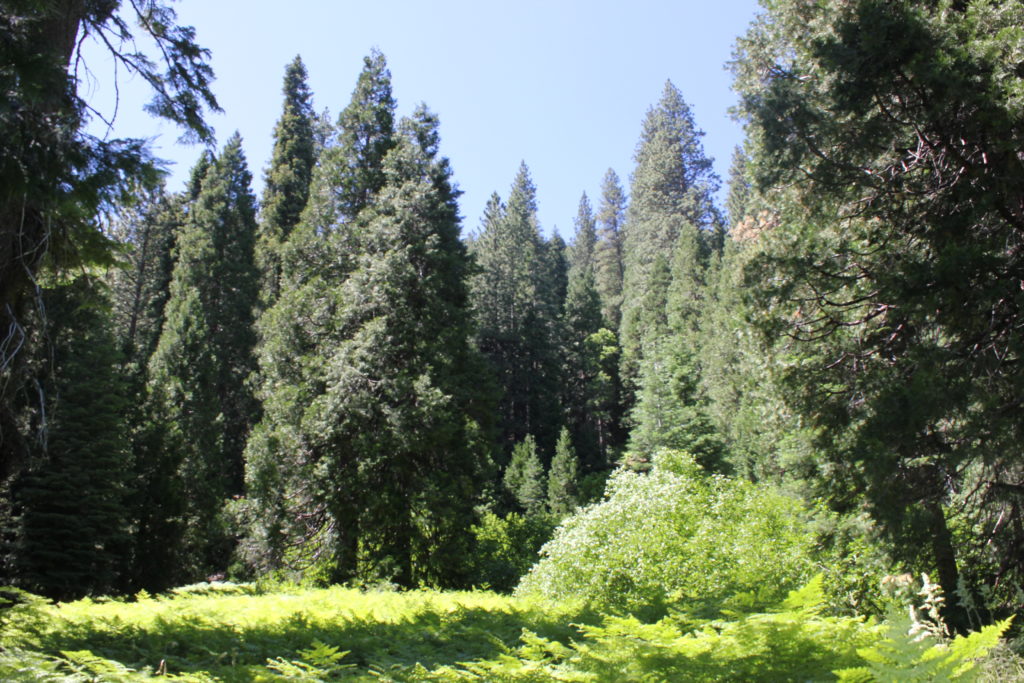
Eventually we climbed out of the dusty valley, and mounted the spur of the ridge that would become Sawtooth farther up. The vegetation changed to manzanita and scrub oak, indicating the toughest elevation gains were behind us. All of us wanted to reach the intended rest spot that would become our campground for the night, near the Twin Towers that grew next to Bear Creek in the Magical Forest. Step, step, push, step – the four of us quickly fell into a rhythm that ate up distance. It was hotter than a bear’s armpit in the sun-blasted valley. Burnt-out lizards scurried into the dead leaves at our passing, causing us to jump and walk faster because they sounded exactly like rattlesnakes. The meager shade of the taller trees was a welcome sight, and the questions continued from Miles. “Is this the magic forest?” “Are we done with the second-hardest part yet?” “How many harder parts are left?” Soon I could see the meadow that opened up to the biggest trees.
“Welcome to one of the most diverse conifer forests in North America!” I gushed expansively. The boys didn’t exactly ooh and ahh, but they knew they were in for something special. “The Twin Towers are right ahead,” I indicated with my tour guide voice, as we entered a wonderland of shade, burnt sienna, and lush green undergrowth. We all passed through the sacred portal formed by their massive trunks, pausing to touch the ancient Ponderosa bark on either side. The campsite next to the creek had been built up again, and our team gratefully dumped their packs and hustled down to the water to explore. I wanted to smell those mountain azaleas again! The boys dodged through trees and boulders as I went from pool to pool, searching in vain for my favorite flowers. Alas, they hadn’t bloomed yet! Or perhaps they were affected by the climate, and reluctant to expose their delicate beauty to a harsh and cruel atmosphere that sucks the moisture out of every living thing. Undaunted, we thrilled at the landscaped watercourse, and delicious views of the opposite ridge that opened up. I pointed out the Beater Cedar, still standing in its lonely spot way up on the ridge, and exclaimed, “That’s where we’re going!”
“All the way up there?” asked Miles, squinting into the sun and wishing he could fly.
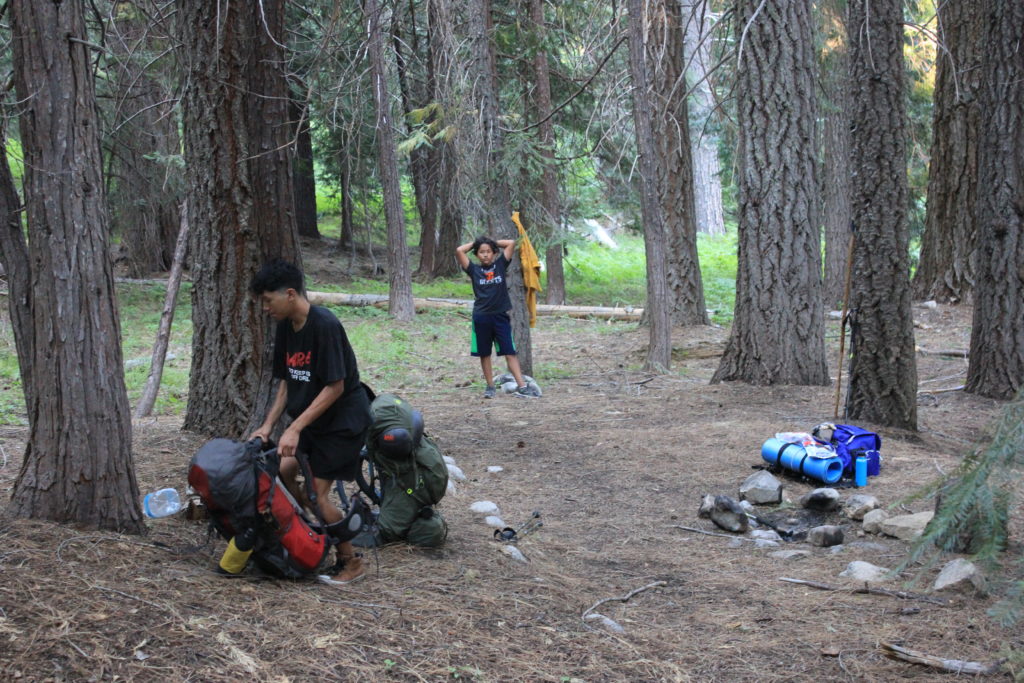
After exploring, we returned and set up camp, arranging our tents in the few level spots possible. The sun was already disappearing behind Sawtooth ridge, but a soft daylight lingered among the overheated trees. It was time to introduce the boys to their first backpacking meals! They eagerly selected an intriguing entrée, tore open the foil pouches, poured in the boiling water, and stirred according to their level of impatience. They were both hungry, but I could see on their faces the fare was less than satisfying. They were used to fresh, tasty meals from their mom’s kitchen, and spooning a pasty, salty mush from a foil bag disappointed their culinary expectations. Still, the mixture packed the corners of their bellies about as well as stuffing fills a pillow, and they were no longer hungry. I chewed on jerky and nuts as usual, and was happy with my low-maintenance menu.
For the boys, this was a much-needed antidote for the accumulated toxins brought on by Covid-19 masks, quarantines, and restrictions… like frequent hand-washing! No campfire or entertainment was needed for this temporary bivouac, and as the light faded away into night, all that was left was to get some rest and be ready to resume our trek in the morning. I pitched my new, lightweight tent using my walking sticks as poles and employing rocks to hold the corners down, to make it as easy as possible to take it down again in the morning. The boys wrestled with unfamiliar folding tent poles and nylon puzzles, while Dimari expertly rolled out the tent he borrowed from me, in the flattest spot… right next to the fire pit. Tired muscles stretched out on top of our sleeping bags, as it was still too warm to snuggle inside. We were all pretty well spent, and conversation was at a minimum – including the banter from the boys sharing a tent. The murmuring of Bear Creek a few feet away sang us all to sleep, and the silent, yellow moon rose without a witness.
“Thousands of tired, nerve-shaken, over-civilized people are beginning to find out
going to the mountains is going home; that wilderness is a necessity.”
— John Muir

